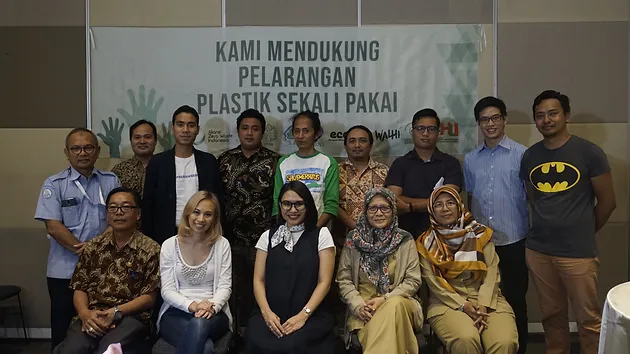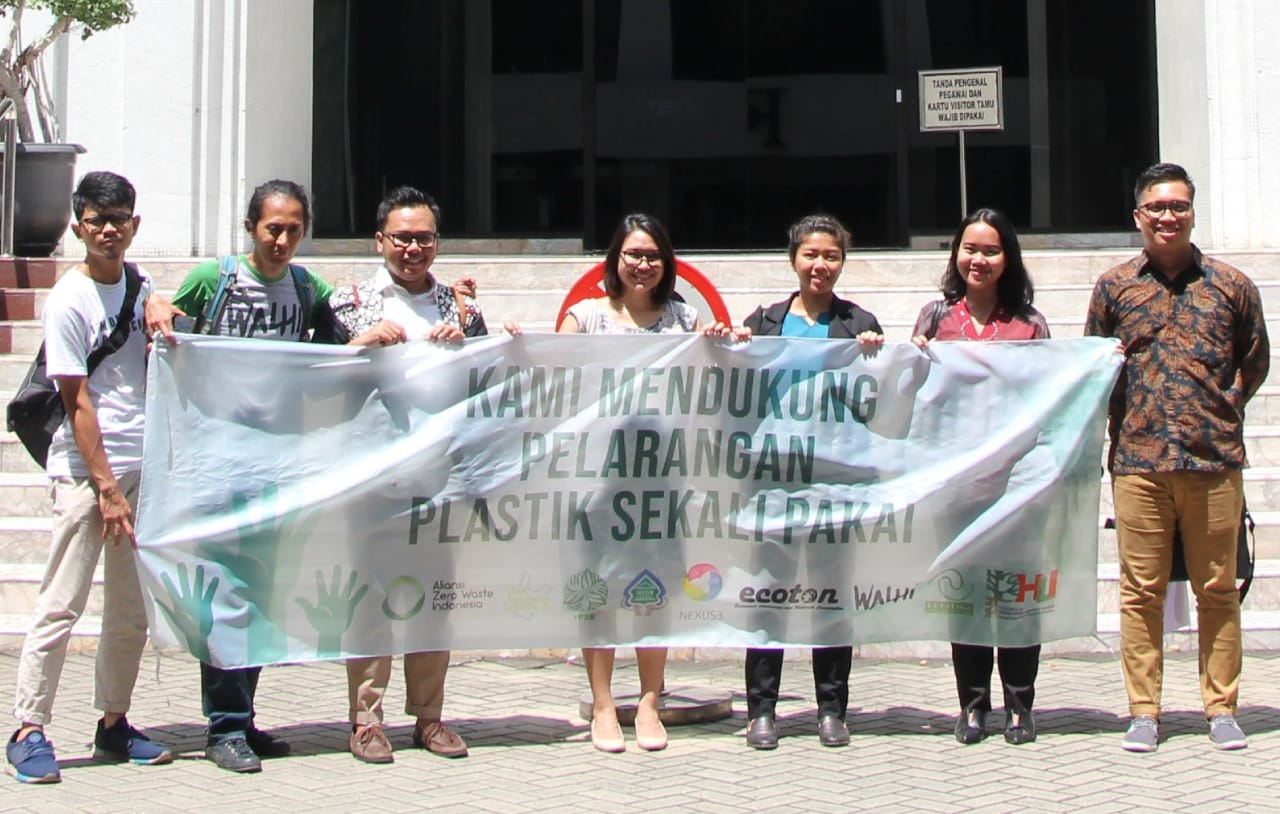Jakarta (29 April 2019). The upsurge of bans of single-use plastics in Indonesia, such as plastic bags, is proof that Indonesia is able to overcome its plastic pollution problem. After Dr. Jenna Jambeck’s research publication in the journal Science in 2015 which mentions Indonesia as the second largest marine plastic polluter in the world, Indonesia has made several assertive initiatives, including plastic bag bans in several localities, such as Banjarmasin City, Balikpapan City, Bogor City, and Bali Province.
The Bali Governor Regulation and Bogor Mayor Regulation about plastic ban is currently being brought to the Supreme Court for a judicial review by the plastic industry and plastic recycling industry, on the basis that the ban does not legally align with the Waste Management Act. That basis has been denied by the Ministry of Environment and Forestry.
“The principle is like this, in the Waste Management Act No. 18 of 2008, ‘waste management’ is classified as ‘waste reduction’ and ‘waste handling.’ Waste reduction consists of waste limitation, waste reuse, and waste recycling. Several localities such as Bali Province, Banjarmasin City, Balikpapan City, and others have implemented a limitation policy on single-use plastic bag waste by not providing single-use plastic bags in modern retail stores, Banjarmasin’s policy has even entered traditional markets. Philosophically, in the Waste Management Act, the highest hierarchy in waste management is prevention or limitation of waste generation,” said Novrizal Tahar, Director of Waste Management, Directorate General of Waste and Toxic Waste Management, Ministry of Environment and Forestry (KLHK).
A coalition of several non-government organizations, environmental law experts and human rights experts support KLHK’s position. The coalition includes the Indonesian Center for Environmental Law (ICEL), Perkumpulan Pembina Hukum Lingkungan Indonesia (PPLHI), Pusat Studi Hukum dan Kebijakan Indonesia (PSHK), Amnesty International, Gerakan Indonesia Diet Kantong Plastik, and other environmental law experts. This coalition has filed an amici curiae document to the Supreme Court, containing academic reasoning from a legal perspective on the alignment of local single-use plastics bans to the Waste Management Act, Legal Drafting Act, and Human Rights Act.
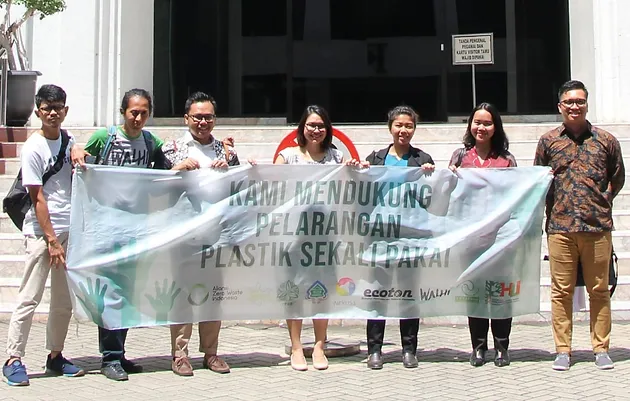
Seen from a legal perspective, other than the Waste Management Act, the limitation of waste generation is also supported by several regulations.
“The Waste Management Act (UUPS), seen from both its Academic Brief which serves as its background as well as the Government Regulation No. 81 of 2012 which serves as its derivative, supports the existence of regulations that oblige the avoidance or prevention of single-use items and packaging. Fundamentally, whatever the title, be it reduction, ban or cessation, as long as the purpose is to avoid or prevent the usage of single-use plastics, then that regulation is still in alignment with the Waste Management Act’s aim to limit waste generation.”, said Raynaldo Sembiring, S.H. Researcher at Indonesian Center for Environmental Law.
One of the things being protested by the plastic waste recycling industry to the Bali Province Government is the relevance of Protection and Management of the Environment Act No. 32 of 2009 (UUPPLH) as the legal basis of Article 7 and Article 9 paragraph (1) of Bali Governor Regulation No. 97 of 2018. Nevertheless, UUPPLH does not contain the terminology of waste as “sampah”. It only contains the terminology of waste as “limbah”, and emphasizes limbah as the cause of environmental pollution and/or destruction. The meaning of sampah and limbah are different, both from its legal definition as well as its legal regime.
“Localities have the authority to regulate single-use plastics ban in locality head regulations under certain terms and conditions. The Waste Management Act gives a delegation to localities to regulate the management of household waste and similar-to-household waste with local regulations. The Bali Government Regulation is a further description of the obligatory norm in the Waste Management Act and the Bali Local Regulation on Waste,” said Dr. Muhamad Ramdan Andri Gunawan Wibisana, S.H., LL.M., Lecturer at Faculty of Law, University of Indonesia.
The Director of Amnesty International Indonesia, Usman Hamid, disagrees with the association of the single-use plastics ban to a violation of the right of waste pickers and recyclers to a decent living.
“The ones filing a judicial review are industries and corporations. What affects the ups and downs of corporation income is market dynamics. Therefore, it is not a part of the human rights principle that must be guaranteed by the state. I see the single-use plastics ban as the manifestation of the state’s obligation to guarantee the right to a good and healthy environment.”, said Usman Hamid.
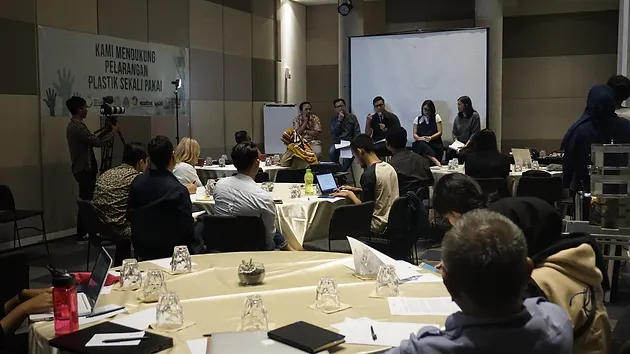
“There are two things in my argument to support single-use plastics ban, the first one is that single-use plastics ban is not a human rights violation, this is explained in Article 28D paragraph (2) of the Constitution of the Republic of Indonesia 1945, Labor Act No. 13 of 2003, International Labor Office (ILO), and International Covenant on Economic, Social and Cultural Rights (ICESCR). The second one is that single-use plastics ban is a manifestation of the state’s obligation to achieve rights of good and healthy environment. This Bali Governor Regulation has an authority to limit rights in order to minimize or avoid threats on environmental pollution and/or destruction and always ensures the rights of good and healthy environment,” said Usman.
Waste activist also evaluates that the judicial review was false addressed and unconstructive. “Based on the public understanding, some studies said that only a few plastics are economically and technically recyclable. From the plastic production within 1950 to 2015, around 60% or 5 billion tons were thrown to the environment, 12 percent burned in incinerator and only 9 percent were recycled. In Indonesia, the data of Ministry of Environment and Forestry said that in 2016 only 11% plastic waste were recycled and only 67% of our waste that were transported. Classic obstacles in recycling single-use plastics in general is collection, plastic quality and steady quantity of supply in big amount that are needed by the factory to reach economic scale,” added Yuyun Ismawati Drwiega, M.Sc., Senior Advisor of BaliFokus/Nexus3 Foundation. “While still having a collection problem, there are additional imported waste that are managed by industry that also need control and monitoring so it won’t reverse to harm the environment and make Indonesia become the world trash can.” stated Yuyun.
According to Tiza Mafira, the Executive Director of Gerakan Indonesia Diet Kantong Plastik, ruling single-use plastics ban becomes an interesting option to attract the local government since there are already many alternative products in the market which are more environmentally-friendly. “Foldable bag as a substitute of plastic bag, reusable container as a substitute of styrofoam, and bamboo straw or stainless steel straw as a substitute of plastic straw, are sold everywhere nowadays. Regulations that ban single-use plastics are actually not proven to aim to burden or punish anyone, they are actually proven to encourage consumer behavioral change to become a more environmentally-friendly behavior.” said Tiza.
“Local government, in this matter is the City of Bogor, do a real effort in waste reduction that’s clearly stated in the Waste Management Act. Whoever sues, that thing won’t detain us because this is our own home.” stressed Elia Buntang, the Head of Environmental Agency of the City of Bogor.
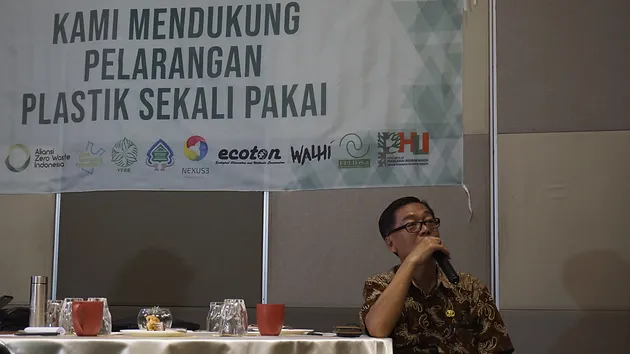
It was confirmed by Koalisi Peduli Sampah Bali which consists of organizations and individuals that support the Government Regulation that bans single-use plastics on Bali. In the petition on Change.org (accessible at www.change.org/AdupiSpotGugatBali), this coalition questions and regrets the judicial review of Bali Governor Regulation.
“As a local from Kuta, I’m concerned that Kuta Beach has an annual international reputation as a Plastic Waste Beach. Since the Bali Governor Regulation of single-use plastics ban was issued, we’ve seen that the residents of Bali were enthusiastic to implement this regulation. Many supermarkets, restaurants, small stores and large retailers don’t give plastic bags anymore even before the regulation applies, and they have started to serve local crafts as the alternatives such as woven baskets, bamboo straws, and wrapping food with banana leaves. This also shows the pride of Balinese culture. It would be unfortunate if the Bali Governor Regulation annulled, this enthusiasm would decrease,” said Ni Wayan Ani Yulinda, one of the co-founders of PlasticDetox Bali and Manager in Yayasan Gelombang Udara Segar Bali.
